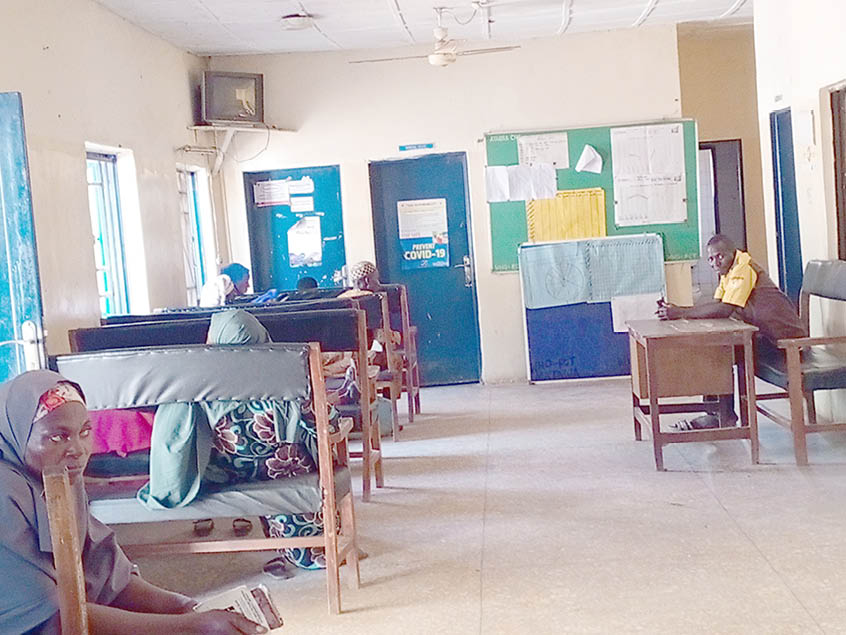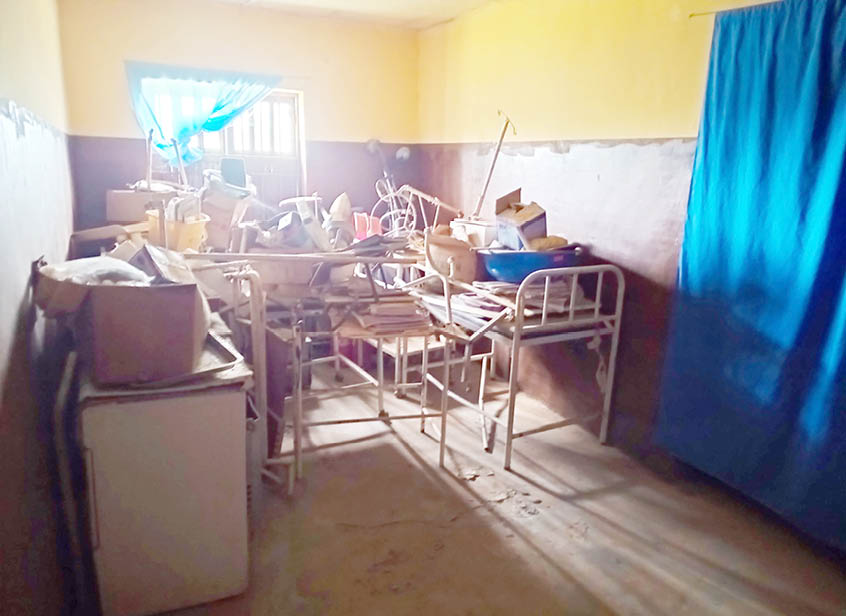FCT health centres lack manpower, drugs, equipment
Despite some primary healthcare centres in the Federal Capital Territory (FCT) having undergone renovations, facilitated by authorities of the area councils, Non-Governmental Organisation (NGO) organisations and corporate organisations, there are no drugs, equipment and facilities in them, Daily Trust Saturday’s findings has revealed. Most of the health centres are also poorly equipped and lack enough […]

Some patients wait for doctor inside PHC in Abaji
Despite some primary healthcare centres in the Federal Capital Territory (FCT) having undergone renovations, facilitated by authorities of the area councils, Non-Governmental Organisation (NGO) organisations and corporate organisations, there are no drugs, equipment and facilities in them, Daily Trust Saturday’s findings has revealed.
Most of the health centres are also poorly equipped and lack enough manpower to cater for the healthcare needs of residents of satellite towns, especially in rural communities of the FCT.
However, the primary healthcare centres were established mainly to augment the services of hospitals and clinics. But so far, some of them have fallen short of that mandate.
There are over 239 primary healthcare centres in the FCT as at the year 2020, built mostly by the government across the area councils and rural areas but only 30 are equipped, a senior health personnel told Daily Trust Saturday.
FCT Area Councils, others share N4.9bn October allocation
FCT health centres lack manpower, drugs, equipment
Daily Trust Saturday visited some the primary healthcare centres in Abaji and Kwali area councils, and observed that aside the renovation work carried out on the structures, beds, chairs, desks, the laboratory, among others, are in dilapidated state.
These healthcare centres are also manned by Community Health Extension Workers (CHEW) while most of the facilities lack drugs, electricity and manpower.
It was also observed that the centres had only few beds to accommodate patients on admission, a situation which compelled health personnels to refer patients with complicated cases to general hospitals, owned by the FCT administration or to private clinics.
Daily Trust Saturday findings showed that area councils are responsible for the funding of primary healthcare centres through their budgetary allocations.
But, corporate organizations and Non-Governmental Organization (NGOs) mostly shoulder the responsibility of building and some times equipping some of the PHCs, instead of the area councils.
Mrs Grace Ayuba, a resident of Kwali, who spoke with our reporter, recounted how her child fell sick and was rushed to PHC in the area last week, but they were referred to a government hospital due to lack of facilities to admit her child.

“I was in Gwagwalada market when one of my sons phoned me that Rebecca fell sick. I quickly rushed back home and took her to PHC in Kwali, but a health personnel at the centre only administered some first aid treatment and then referred us to a government hospital,” she said.
Also speaking, Moses Adams, a patient at Kwaita PHC in Kwali, said despite the PHC being partially renovated, there was no manpower, especially doctors or nurses to attend to patients in the area.
He said it was unfortunate that the PHC lacked drugs when he was down with malaria, adding that a community health worker at the facility prescribed drugs for him to go and buy.
He said two days after he took the drugs without any improvement, he decided to go to the general hospital, where some tests were ran on him and he was later admitted at the hospital.
“When I discovered that there was no improvement after taking the drugs prescribed for me at PHC in Kwaita, I had to go to Kwali General Hospital where doctors later admitted me,” he added.
Mr Joseph Monday, a volunteer worker at the PHC in Kwaita, while speaking with our reporter, said the centre has only two staff who are volunteers and two community health workers that attend to patients who visit the PHC.
“The truth is that the PHC lack the manpower, especially doctors and nurses, as those who attend to patients are community health workers and volunteers,” he said.
He said the health facility only attends to minor cases due to the absence of facilities and manpower, noting that patients with serious cases are referred to Kwali General hospital.
According to him, the PHC also lacks beds, desks and chairs, saying most of the chairs and desks are broken.
Also, Mu’azu Shuaibu, a resident of Gada-Biyu, who also spoke with our reporter, lamented the dilapidated state of PHCs in the area.
He recalled rushing his wife who was in labour to the facility in the area but there was no doctor to attend to her, saying a health personnel later referred his wife to Kwali General hospital where she later put to birth.
He described as unfortunate the absence of doctors and nurses to attend to patients, especially emergency cases, at the health centres.
Also, at Kuje primary healthcare centre, Daily Trust Saturday observed that a doctor attended to several patients, especially pregnant women who came for ante-natal and medical checkups.
Though the facility has nine health workers, one resident doctor attended to patients, mostly women and children, while staff members including a chief medical laboratory scientist, midwife and laboratory technician were on ground.
The situation is also not different at the PHC in Abaji town. Though the facility has been renovated, it lacks adequate manpower, especially doctors and nurses.
The PHC has been overwhelmed by students from the School of nursing, Gwagwalada and Kuje, who are undergoing industrial attachment at the centre.
The facility also lacks enough cleaners, despite the influx of patients from rural communities, including the Fulani who patronise the centre for treatment.
A patient, simply identified as Abdullahi, said manpower, inadequate bed space and consumables were among major challenges at the health centre.
“I believe you are a resident of Abaji. If you come sometimes, especially when there is an accident on the highway, you will see patients lying on the floor because of lack of bed space,” he said.
According to him, the PHC has only one doctor, a nurse and one midwife, adding that the doctor was always under pressure due to the influx of patients from various communities seeking healthcare services.
He said the PHC has no drugs as patients are given prescriptions to buy from pharmacies or chemist shops in the area. He also said patients on admission and their relatives stay in darkness at the centre due to lack of constant electricity.
“Everybody knows that the cost of fuel or diesel for generator is very expensive in the country today,” he said.
He added that “aside that, the doctor sometimes travels for a workshop or some other assignments in Abuja. And during that period, the PHC remains without a doctor until he returns,” he said.
The situation was also the same at PHC Pandagi in Abaji area council when our reporter visited. The complain of lack of drugs and inadequate manpower resonated.
Some residents, however, said patients mostly travel to Abaji town for medical treatment due to lack of doctor and a nurse.
“The truth is that the PHC has facilities, but the major challenge is lack of manpower, especially doctor and nurses. That is why the PHC along Agyana road in Abaji, is always occupied by patients including Fulanis from the villages,” he said.
When contacted, the chairman of Kwali Area Council, Danladi Chiya, who is also chairman of the FCT chapter of the Association of Local Government of Nigeria (ALGON), neither picked his calls nor replied to a text message sent to his phone.
However, Daily Trust Saturday is yet to get the reaction of the secretary of health and human services secretariat of the FCTA.
